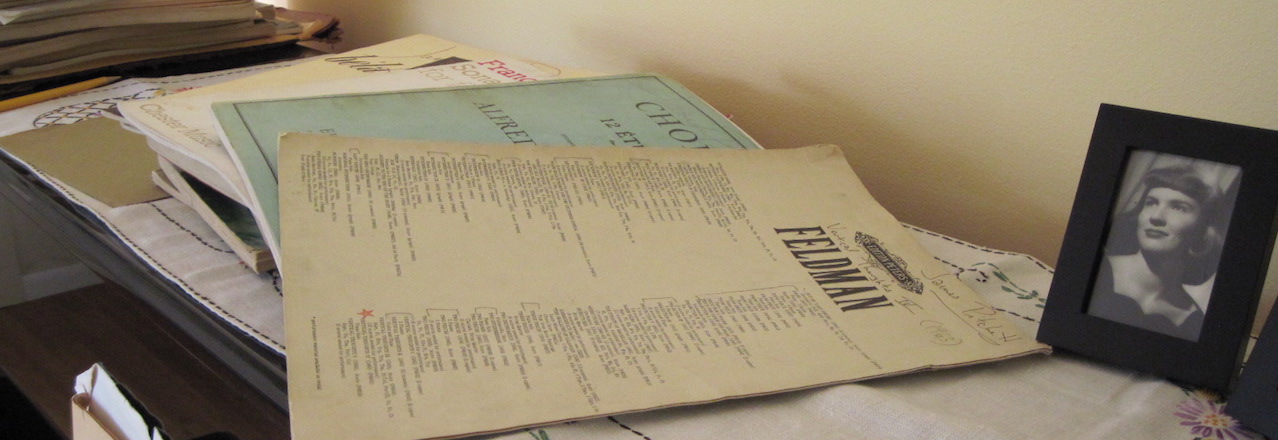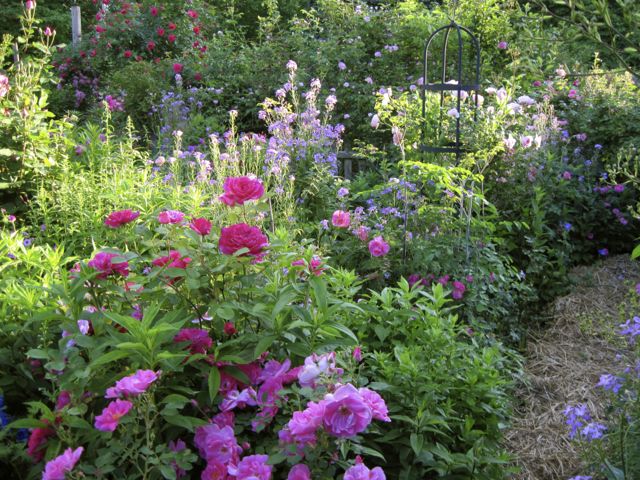I’ve posted another piece of “non-non-fiction” here: As night falls, which is a kind of sequel to my earlier The old rose reader. Frances has composed a new work using this text and it will be premiered in Seattle later this month. For those not familiar with The old rose reader, here’s the story of that work, and then the story of how As night falls came about.
Back in 2002, Frances asked me to write a poetic text that used the names of old roses. She is a rose fanatic (that’s her garden above). She loved the sound of those names (especially the French ones), and she wanted to write a piece that used them for text. In response, I wrote The old rose reader, a series of stories and rose descriptions. These were wrapped in a framing story of an older couple:
In her later years she had difficulty sleeping, and so he would sit by her bedside and read aloud to her. Taking up an old horticultural reference book, he read the names of roses.
As it struck his fancy, at times he would read from the historical and cultural notes about the roses. At times he invented stories about them. But mostly he read only the names, one after another.
The text was in 25 sections, each two texts: one foreground and one background. The foreground texts were stories or descriptions of individual roses. The background texts were just lists of other old rose names.
Frances took this and made a piece for violinist Mari Kimura. I made a video version of the text to be used in the performance. It was very successful: Mari has played it all over the world, and she’s recorded it, too. Other violinists took a liking to it. Frances’ good friend and collaborator, the wonderful violist Liuh-Wen Ting, wanted to play it, too, so Frances made a sequel called The book of roses and memory. This used stories from the original set that didn’t make it into the violin piece. That piece has been recorded, too.
Frances and I enjoyed working together on these pieces so much, we dreamed of other possibilities within this same world. In the violin piece, she thought of the violin as being the voice of the woman, in counterpoint with the man’s narration of the stories. When she thought of doing a companion piece for lower strings (bass or cello), I suggested that the narration should be from the woman’s point of view. The next piece in the series wound up being for violin and viola duo, but the idea of reversing the point of view remained. “The old rose listener” was my working title, but Frances came up with the much better title As night falls, which is taken from one of The old rose reader stories.
Structurally the two texts are similar. As night falls is in 34 sections, each with a foreground and background text. The backgrounds here are derived from bits of the stories in The old rose reader. The foreground is in her voice: her thoughts and memories. You can read the text in either PDF or Word formats.
Like The old rose reader, I wrote this with the idea that Frances could use as much or as little as she wanted in the piece, shaping it to fit her music. By necessity, she only used a portion of the text: I always write too much. I’m working on a “radio play” version using the entire text and hope to have that audio posted here sometime soon.
The premiere of As night falls will be in Seattle at the University of Washington on January 13th. It will be performed by Melia Watras and Michael Jinsoo Lim, with Sheila Daniels as narrator.


I just finished readed the Old Rose Reader that you wrote and it was great! So very poetic.
I live in Australia, any chance of seeing As Night Falls coming out and performing in our neck of the woods any time soon?
Thanks for the kind words, Peter — glad you enjoyed it. No plans for any performances in Australia, sad to say, although we’d love to visit again!